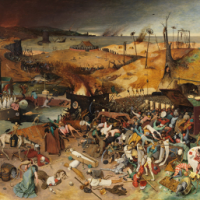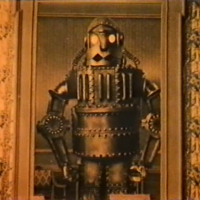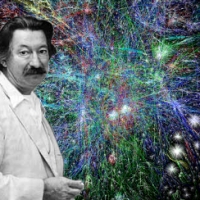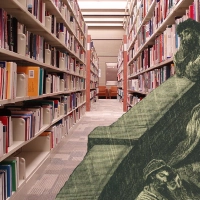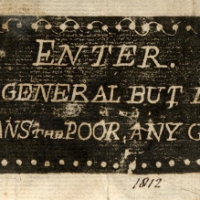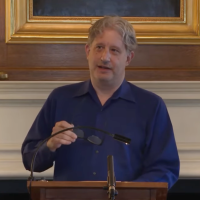There’s an Apparatus for That – Reflections on Vilém Flusser’s book Post-History
Critiquing this or that aspect of society can be an invigorating experience. One simply selects a specific topic and sets about excoriating it, methodically ripping it apart with a mixture of impassioned frustration and witty aphoristic turns. Granted, it is a good deal easier to go after a particular aspect of society than it is to set the focus of one’s critique to society as a whole. One of the risks is, of course, that critiques may swiftly become dated, that the things they tear down may appear anachronistic only a few years later, or that people may revisit these criticisms in the present and reassure themselves that things are different now. Yet one of the characteristics of a truly vital critique, one which “wishes to be a mirror to the human situation” (2), is that it retains its ability to discomfort the reader decades after its initial expression. After all, “a mirror to the human situation” can still serve as a way of seeing a reflection – even if one needs to brush a little bit of dust off its surface first.
And once the dust is brushed away from the mirror that is the philosopher Vilém Flusser’s book Post-History, what is reflected is a damning image of the human situation.
The world presented in Post-History is one that is steadily being configured into an “apparatus.” Indeed, in Flusser’s view part of the story of Western culture has been an ongoing project to steadily make an apparatus of existence – one in which all aspects of the world (including humans) are gradually turned into little more than objects to be manipulated. The example of the Nazi’s extermination camps appear, for Flusser, as the prototypical example of “apparatus” – factories in which people ceased to be human beings and simply became objects. Though Flusser recognizes that “apparatus” can take on many forms, even ones that try to pass themselves off as salubrious, he emphasizes that pleasant sounding aims may only serve to distract from the ends they really pursue. For, they remain “apparatus”:
“black boxes that function with complex inner-workings in order to realize a program.” (9)
And this “program” is one wherein people are reduced to nothing more than things, objects to be pushed, prodded, and manipulated in accordance with the aims of “apparatus.” While Flusser saw in the death camps the incipient manifestations of “apparatus” he notes that literal extermination is a crude form of apparatus, going forward:
“It will be followed by less brutal objectifications, such as the robotization of society. But it does not matter which form it will assume: it will always be an objectifying manipulation of mankind.” (10)
Throughout the course of Post-History, Flusser characterizes numerous things as having become “apparatus” – ranging from “science has become an apparatus” (42) to “the supermarket is an apparatus” (60). And while it may seem somewhat odd to state that things as seemingly disparate as “science” and “the supermarket” can both become “apparatus,” it is the seemingly comical distance between the two of them which functions to demonstrate the variety of things in the present world that, in Flusser’s estimation, now fucntion with the goal of turning people into objects – whether they be objects of dispassionate analysis or turned into “consuming objects.” The point which is further emphasized by the range of things which Flusser labels as “apparatus” is his contention that post-industrial society should be understood as the result of the success of “apparatus,” it is no longer a society in which certain scattered aspects speak of “apparatus,” instead it is “a society fully equipped with apparatus” (77).
Alongside Flusser’s discussion of “apparatus” one also encounters descriptions of “programs” and thus the question emerges as to the source of these “programs.” The programmers in the age of “apparatus” represent in Flusser’s thinking “the real dominant class” (32). Flusser credits the programmers with performing an integral role in the advancement of the “apparatus” and with being the people at the forefront of disseminating the ideology that treats humans as being reducible to objects to be enumerated, manipulated, and even eliminated. And while their positions of authority may make the programmers seem as though they are in control, Flusser highlights that the programmers are every bit as incorporated into “apparatus” as everybody else – for in the end “they are themselves programmed to program” (33).
Beyond the specific analysis of “apparatus” and “programs,” Flusser turns his withering wit towards technology, mass culture, alienation, and the prospect of freedom and democracy. Some choice quotes demonstrate his wry assessment of the world.
Regarding alienation:
“We are on the move, because our world has been so radically transformed that it has become unhabitual and uninhabitable. We do not recognize ourselves in it. And we cannot habituate ourselves to that.” (67)
Regarding democratic values:
“We continue to be convinced that there are rights such as freedom, justice, and human dignity. But we have learned the hard way that every attempt to realize such rights leads to the opposite of what was intended. That it leads to slavery, injustice, and indignity.” (112)
Regarding consumer technology:
“These idiotic objects, these ‘gadgets’ that surround us, program us in two different ways. We are programmed so that we can no longer live without them and we are programmed in order not to notice their stupidity.” (123)
Regarding the spectacle of mass culture:
“Apparatus have codified the world in order to entertain us. They have turned the world ‘spectacular.’ They are now seeking to sensationalize our own death. They have already sensationalized the deaths of others. They have overcome mourning. They have turned the death of others into kitsch. They will turn our own death into kitsch. Once this has been reached, we will have been reprogrammed. Our unhappy consciousness will finally rest. Programmed life shall be totally entertaining. This is the aim of the programs with which we are collaborating.” (114)
As the above quotations demonstrate, Post-History presents a rather gloomy reflection of the world. It is an assessment born of a sentiment that it is no longer a matter of resisting the imposition of “apparatus” but instead of realizing that “apparatus” has already won. And thus the challenge becomes one of figuring out how one can function within these new constraints. The future will be that which adheres to the programs set up by “apparatus.” In this context Flusser positions himself in a defiantly contrarian and even proudly reactionary position – insofar as “progress” is what is an accordance with the ends of “apparatus” than he sets himself up to stand athwart of it – and so Flusser deploys terms like “counter-revolutionary” and “reactionary” as positive resistant titles to represent defiance in the face of the onward rush of “apparatus.” Thus, as he puts it in describing those who resist apparatus (in an almost nihilistic turn):
“We are counter-revolutionaries in both senses: we dread romantic anti-rationalism as much as enlightened rationalism. We know that they are both within the program and we know their realizations: fascism and the apparatus society. In other words: we know that intelligence has stupidity, which the stupidity of the heart ignores. This makes our counter-revolutionary zeal ambivalent. We are counter-everything. Our engagement with freedom is totally negative.” (129)
For what can freedom truly mean in a world subsumed in “apparatus” and “programs”? When freedom has become little more than a word stapled onto the surface of “programs” and “apparatus” that preclude the possibility of real freedom? The world of “apparatus” appears as a sort of game – it is a game of distractions, simulated emotions, and it is a game in which we find ourselves trapped as players though the rules have been badly explained and there is a clear sense that the game itself always wins.
And yet Flusser does not argue that we can escape the game, instead:
“Freedom is conceivable only as an absurd game with apparatus, as a game with programs. It is conceivable only after we have accepted politics and human existence in general to be an absurd game. Whether we continue to be ‘men’ or become robots depends on how fast we learn to play. We can become players of the game or pieces in it.” (26)
* * *
Post-History is a ferocious critique of society. Or, to put it mildly: if you are looking for a light read that will leave you feeling content…this may not be the book you want to read. That being said, if you find yourself exclusively reading books that leave you feeling content than perhaps this is precisely the type of book to make you rethink your contentment. Indeed, if you are interested in engaging with a book that demands your willingness to argue back – and a book that has no qualms about painting a thoroughly unnerving picture of the world, than Post-History should not be missed. Indeed, one of the aspects of Post-History that makes it particularly powerful (and devastating) is Flusser’s refusal to offer false hope – which is made all the stronger by the dry humor that underlies Flusser’s writing.
In the introduction to Post-History, Vilém Flusser states his hope that the text will act as a “mirror to the human situation” – and the reflection of society that he presents is a damning one, which has lost little of its power over time. And yet, Post-History is a text that is not meant to be strictly approached as a text, instead the book is a collection of lectures which Flusser delivered in various locales – and though one may read the book to oneself the words were composed to be read aloud (and to be followed by a discussion). The twenty lectures, which make up Post-History cover a range of topics most of which feature a title based on a basic formula of “Our [Something]” – these include “Our Knowledge,” “Our Health,” “Our Dread,” “Our Clothes” and many others. Though each of these chapters was originally intended as a prompt for a discussion between Flusser and those hearing him speak, each of the chapters also represents Flusser engaging in a sort of dialogue with the work and thought of one of his contemporaries such as Hannah Arendt, Martin Buber, Ernst Bloch, Theodor Adorno, and Marshall McLuhan (to name a few). It is not only in his thought that Flusser demonstrates an interesting similarity to some of those who he chooses as intellectual interlocutors but also in certain details of his biography. For, as a Jew, Flusser (like Arendt and Marcuse) was forced to flee from Europe during the rise of the Nazis. When Flusser writes about Auschwitz he is not just using it for the sake of finding a strong example, instead he is speaking of a place where members of his own family (his mother, sister and grandparents) were murdered.
It may well be that Flusser’s dark assessment of the world is reflective of his own encounter with just how dark the world can be.
Flusser’s discussion of “apparatus” is an important contribution to the critique of technology – and as with any genuinely rigorous critique of technology, his is a critique that is thoroughly couched in a larger critique of society as a whole. Much of his writing about society and culture is reminiscent of the critical theory put forth by thinkers associated with the Frankfurt School (Adorno and Marcuse are amongst those whose thought he is discussing in some of the chapters) – and though Flusser does not use the term “culture industry” much of his writing demonstrates a similar distrust for mass culture. In terms of technology, Flusser’s focus on “apparatus” and the way in which all of society has become subject to it bears more than a passing resemblance to Lewis Mumford’s concept of “the megamachine” or Jacques Ellul’s idea of “technique.” For “apparatus” (like “the megamachine” and “technique”) is not meant as descriptor of a particular machine or even of technology (as such) but instead captures a totalizing force and tendency of which modern technology is simply a prominent reification. When Flusser describes how one thing or another is “apparatus” he is demonstrating the range of the “apparatus” and the way in which the ideology that reduces humans into mere objects has spread widely and become the “program” being executed across numerous areas of society. Furthermore the way in which Flusser portrays the world of “apparatus” as one in which humans have lost their place is evocative of Gunther Anders thinking on alienation and on the “obsolescence of mankind.” While the all encompassing power of “apparatus” which turns even the “programmers” into little more than cogs is a theoretical move that will be familiar to those who have read Mumford or Ellul – Post-History presents this critique in easily digestible portions.
The atmosphere conjured up by Post-History is far from hopeful – and though Flusser frequently writes with a playful tenor (these were originally delivered as lectures, after all) the overall tonality of the piece is distinctly woebegone. The unceasing negativity verging on nihilism of Post-History may drive some to disregard the book, particularly as Flusser stands firm in his belief that everything has been compromised by “apparatus” (including the normal modes of resistance). Yet to disregard Post-History would be a mistake, not only because it is a fascinating (and often bitterly amusing) read – but because the text remains a “mirror to the human situation.” It is a book that is meant to be argued with, it is a book that is meant to be talked back to, but the reason that Flusser’s text is so able to raise the hackles of its readers is likely because of the ways in which the reflection that Post-History presents is still prescient.
The puzzling world with which Post-History confronts its readers is one wherein:
“We can no longer be revolutionaries, which means to be opposed to the operative program through other programs. We can only be saboteurs, which means to throw sand on the apparatus’ wheels. With effect: every current emancipatory action is, when intelligent, a subversive action.” (127)
Post-History is still a heaping shovel of “sand on the apparatus’ wheels.”
Works Cited
Flusser, Vilém. Post-History. Minneapolis: Univocal Publishing, 2013.
Note: I would like to thank Eric Goodman (the man behind the excellent performance Thus Spoke the Spectacle) who first recommended Post-History to me.
Related Content
Towards a Bright Mountain – Laudato Si’ as Critique of Technology
The “Good Life” or “The Goods Life” on the thought of Lewis Mumford
The Triumph of Technique – on the thought of Jacques Ellul
“The Attempt to Keep Conscience Alive” Reflections on Gunther Anders’ book Burning Conscience


